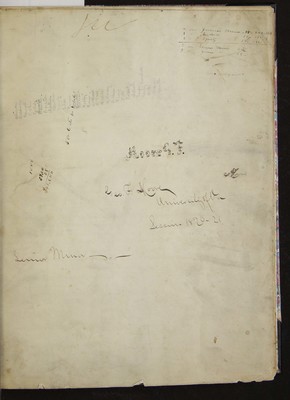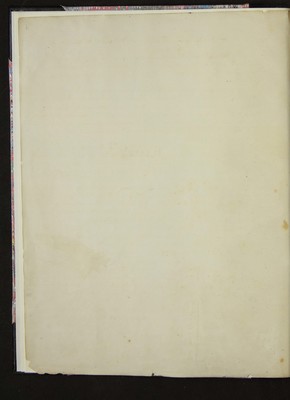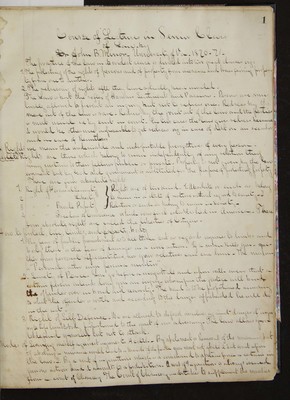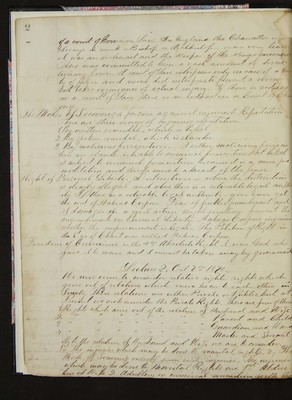Pages
2
3.
4 on Junior Minor. 18. 240. 180 3 " Evidence 18. 180. 3 " Equity 18. 180. ———————————————————— 10 on Senior Minor. 60. 3 " Junior " 18.
lllll + llllll + llllll +
[written sideways across page] Altman Baldwin Bennett Berlin Berkely (...) Bonner Boylston Chandler Christian Doyle Estes Fraser Greer Herndon Hilliard Kelley (...) Matthews McCall Michie Maloney Nelson Penn Pitts Pollard Pillock Taylor Toney Turnbull Walker Williams Winston [written sideways up the page] 5 or 6 cts for (...)
Moore G. F.
[written sideways] 1000. $7.00 .08 ————— $45,600 Moore Geo. F. Moore University of Va
Sessioin 1870-71
Senior Minor
4
1 Course of Lecture in Senior Class of Law by Dr. John B. Minor— University of Virginia 1870-71. The practice of the law in widest sense is divided into two great classes viz: 1. The protecting of the rights of persons and of property from invasion and transferring proper— ty from one to another. 2. The redressing of rights after they have actually been invaded. The Law is but the reflex of Human Sentiments and Passions. Persons are mu-— tually allowed to prevent an injury but not to redress one. Redress by the mere act of the law is rare. Redress by the joint act of the law and the parties is most usual ie by suit in court. In two cases the law gives redress because it would be otherwise impossible to get redress viz in case of debt on an execution and in case of Remittur. [By rights] we mean the undeniable and indisputable perogatives of every person. [Absolute Rights] are those which belong to man independently of any relation they may sustain to their fellows public or private. Property is not given by the Gov— ernment but by God and government is instituted for the purpose of protecting property. There are four absolute rights. 1. Right to Personal Security } Rights are of two kind 1. Absolute or such as belong 2. " " " Liberty } to man in a state of nature without regard to society. 2. 3. " " Private Property } Relative or such as belong to man in Society. 4. " " Freedom of Conscience which was first established in America. These four absolute rights are called the liberties of citizens. [How to] protect, life, limbs, and {property}, body. 1. By fear of public punishment as to all three but as regards injuries to limbs and body there is the fear of damages in a civil action. If a man kills you— nei— ther your personal representative nor your relatives can sue him. The maxim is "personalis actio eum persona moritum" 2. Society of Peace. You go before a magistrate and upon oath swear that a certain person intends doing you an injury. Whereupon the justice will [bring] the offender over in bond and security. The bond is to be proportional according to what the offender is worth and according to the danger apprehended he will do in the act. 3. Right of Self-Defense. We are allowed to defend ourselves against danger of inju— ry to life limb & body proportioned to the onset of our adverssary. The law allows you to defend yourself but not to attack. Modes of [Securing] oneself against injuries to Health. By abatement or Removal of the nuissance but if abating a nuissance would lead to a breach of the peace you must not abate it but wait upon the law. 2. By a writ of injunction which is a command to abstain from a certain in jurous action and it amounts to a prohibition. A writ of injunction is always issued from a court of Chancery. The Court of Chancery undertakes to supplement the remedies
5
2 of a court of Common Law. In England the Chancellor was always in rank a Bishop or Archbishop— was very learn— ed was an an ecclesiast and the Keeper of he Kings conscience. There was committed to him a vast amount of discre— tionary power. A court of Law interposes only in case of a sur— ty of peace and never did interpose to prevent a wrong but takes cognizance of actual injury. If there is redress in a court of Law there is no redress in a court of Chan— cery. The Modes of Securing a person against injuries to Reputation. There are three ways of injuring reputation. 1. By written scandal, which is libel. 2. By spoken scandal, which is slander. 3. By malicious prosecution. Neither malicious prosec— tion nor slander is liable to original prosecution but libel is subject to original prosecution because it is a more pre— meditative and tends tends more to a breach of the peace. Right of Personal Liberty. Distinction is where the [distinction] is clearly illegal and where there is a colorable legal author— ty. If there is a colorable legal authority— you can get the writ of Habeas Corpus. Fear of public punishment and of damages of a civil action might sometimes prevent the encroachments on Personal Liberty. Habeas Corpus inquires whether the imprisonment is legal. The Petition of Right in the 3rd year of Chas 1 was called Habeas Corpus. Freedom of Conscience is the 4th Absolute Right it was God who gave it to man and it cannot be taken away by government.
Lecture 2, Oct 2nd 1870. We now come to consider relative rights— rights which grow out of relations which men bear to each other in Society. These relations are either Private or Public but at Present we are to consider the Private Rights. There are four of these 1. Rights which arise out of the relative of Husband and Wife 2. " " " " " " " " Parent and Child 3. " " " " " " " " Guardian and Ward 4. " " " " " " " " Master and Servant As to the relation of Husband and Wife we are to consider. 1st. The injuries which may be done to marital rights. 2. The Mode of Securing oneself from such injuries. The injuries which may be done to Marital Rights are 1st Abduc— tion of Wife 2. Adultery or criminal connection with the




